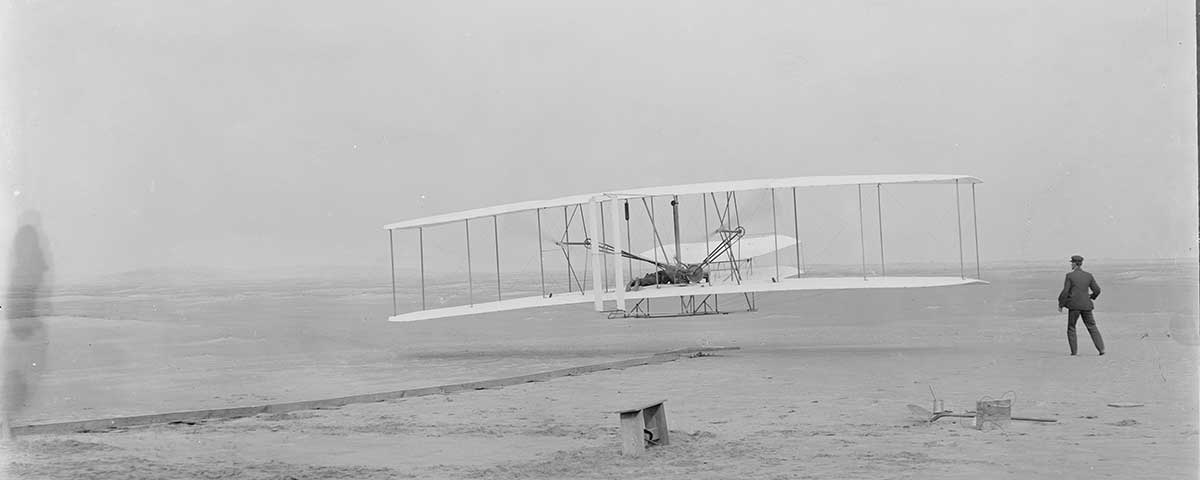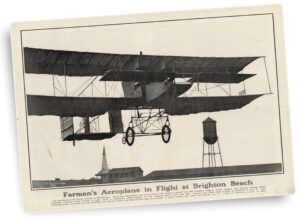Author David McCullough has produced some of the most celebrated biographies in recent history. For half a century, he’s brought the past to life, introducing readers to topics that range from the American Revolution to the Johnstown Flood to Harry Truman. In his latest book, The Wright Brothers (Simon & Schuster), McCullough offers an elegantly crafted portrait of the two men at the forefront of human flight. The Pulitzer Prize–winning biographer combed through a thousand pages of letters and diaries, and traveled from Ohio to Kitty Hawk, N.C., to Le Mans, France, to show readers the real Orville and Wilbur Wright and relate what their story can teach us about faith and determination.
What was it about the Wright brothers that attracted you as a writer?
This year, it’ll be 50 years since I began work on my first book, The Johnstown Flood. It received a positive reaction from readers, and I was immediately approached by two different publishers who wanted me to write about the Chicago fire and the San Francisco earthquake.
Well, I thought to myself, I’m being typecast already, and I’ve only written one book. I didn’t want to be “Bad News McCullough.” So I decided that my next book would focus on a symbol of affirmation.
One day while out to lunch with a few friends, the discussion turned to the challenges [Washington] Roebling faced in building the Brooklyn Bridge. I said, “That’s it! That’s my next book.” Ever since, all of my books have been about affirmation, about hardship overcome through determination and strength of character.
The Wright brothers had character in abundance. Wilbur was unquestionably a genius, and Orville was a brilliant innovator. They worked hard as hell. Theirs is the kind of story I love to tell.
GET HISTORY’S GREATEST TALES—RIGHT IN YOUR INBOX
Subscribe to our Historynet Now! newsletter for the best of the past, delivered every Wednesday.
Their strength of character certainly comes through in the book.
They were incredibly determined and possessed a will to succeed. They had no formal training, no financial backers, no inside connections. Their achievements were the product of pure grit and hard work. This started with their upbringing, which is something I believe has tremendous influence over how a person turns out. The home environment that the Wright brothers enjoyed is part of the bedrock of their story and their success. Their father’s insistence that they read, that they learn the values of honesty, modesty and determination, and his undying faith in their ability to succeed had a hand in their accomplishment.
Learn more about
Did you come across anything in your research that surprised you?
Yes, I was impressed by how superbly educated they were in the liberal arts even though they never finished high school. Their range in reading and their ability to use the English language creatively and effectively were remarkable.
There was a wonderful interview that Orville once did. The reporter asked him if he agreed with so many Americans who felt that he and his brother were ideal examples of how far an American could rise without having any advantages in childhood. Orville was a little put out by that statement and replied that it wasn’t true. He told the reporter that he and his brother had the greatest advantage that anyone could hope for in childhood: They grew up in a family that encouraged intellectual curiosity.
They lived in a house that had no running water, no electricity and no telephone, but they had an ample supply of books—and good books, at that. Books that weren’t easy to read.
Wilbur and Orville were very sophisticated, highly cultivated.
Speaking of cultivation, the hockey stick incident was a remarkable twist of fate in Wilbur’s life and, as it turned out, for the world, too.
Isn’t that incredible? In each of my books, I’ve discovered something that wasn’t known previously. The thrill that goes with something like that is hard to put into words. It really lifts you out of your chair.
As a teenager, Wilbur was struck in the face with a hockey stick and badly injured. He became something of a recluse after that, and certainly it put an end to any talk of him going to Yale. Instead, he stayed home and read constantly, voraciously, most importantly, about flight. That was the seed that would ultimately become the airplane.
Reading in [their father’s] diary about who was wielding the hockey stick—a troubled man named Oliver Haugh—was a big break in the detective work.
What seemed to be one of the worst things to ever happen to any of the Wrights caused a swerve in their lives that was immensely beneficial to the world. It’s a marvelous example of how truth can be both stranger than fiction and at times more powerful in its effect. History is made of chance encounters and lucky breaks.
What might have become of the brothers had this not occurred?
My guess is Wilbur would have gone to Yale and then on to become a distinguished professor of art history or architecture. He hints at that in his letters to his father, speaking of how an intellectual life in education was his inevitable destiny. When he was in France for flight demonstrations, he often visited the cathedrals and the Louvre. As his letters illustrate, he was very insightful in his perception and interpretation of art. He was incredibly sophisticated, and yet for years, people have dismissed him as a simple bicycle mechanic.
And Orville?
Orville would have done well at just about anything. He may have done something with automobiles, which he loved, or any number of other fields where his mechanical abilities would have shone.
What do you hope readers will take away from this story?
Reassurance that there is a spirit of innovation and accomplishment in America that will and must continue. If you ever think you don’t have sufficient advantages to make the most of your life, look to the Wright brothers. They’re infinitely inspiring not just in their work ethic, but also their great modesty in the wake of such momentous accomplishments.
This is a great American story. It’s a great human story.

this article first appeared in American history magazine
Facebook @AmericanHistoryMag | Twitter @AmericanHistMag





